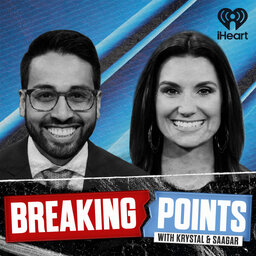4/26/24: Don Lemon CONFRONTED On Media Bias, Bernie 2020, RussiaGate
Our first Counter Points Fridays premieres NOW with former CNN anchor Don Lemon. Emily and Ryan ask him about his reporting at CNN, Bernie, Social Media censorship and more!
To become a Breaking Points Premium Member and watch/listen to the show AD FREE, uncut and 1 hour early visit: https://breakingpoints.supercast.com/
Merch Store: https://shop.breakingpoints.com/
In 1 playlist(s)
Breaking Points with Krystal and Saagar
Breaking Points is a fearless anti-establishment multi-week Youtube and Podcast which holds the powe…Social links
Follow podcast
Recent clips

1/21/26: Trump Demands Greenland At Davos, Canada Breaks With US, Market Tank, MN Cops Vs ICE
1:23:05

1/21/26: Zohran Calls For ICE Abolition, IDF Buckles To Ms Rachel, India Joins Fight Against Saudis
58:01

1/20/26: Trump leaks Macron Text, Don Lemon Church Protest Debate
1:18:22
 Breaking Points with Krystal and Saagar
Breaking Points with Krystal and Saagar